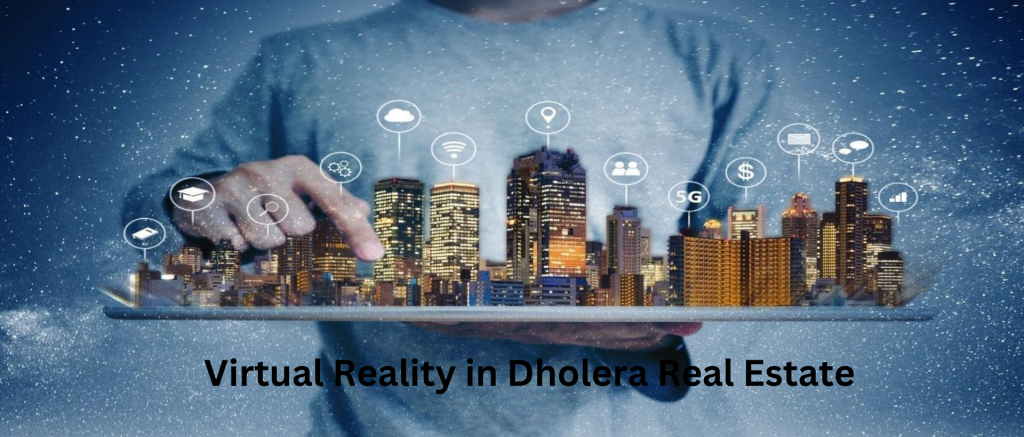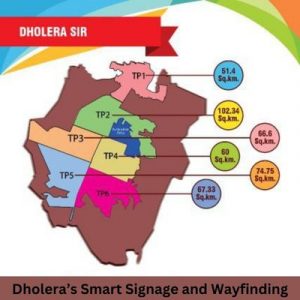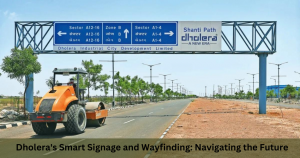In recent years, virtual reality (VR) has revolutionized various industries, and real estate is no exception. One of the most ambitious smart city projects in India, Dholera, is leveraging VR technology to transform its real estate sector. As the first planned smart city in India, Dholera aims to integrate advanced technologies to enhance urban living and infrastructure. VR is playing a crucial role in realizing this vision by offering immersive experiences, streamlining processes, and providing innovative solutions to real estate challenges.
Dholera: A Visionary Smart City
Located in the state of Gujarat, the Dholera Special Investment Region (DSIR) is poised to become a global manufacturing and trading hub. With its strategic location, world-class infrastructure, and government support, Dholera is set to attract significant investments and generate numerous employment opportunities. The city is designed to be sustainable, efficient, and technology-driven, incorporating smart solutions for urban planning, governance, and service delivery.
Virtual Reality: An Overview
Virtual reality is a computer-generated simulation of a three-dimensional environment that can be interacted with using special electronic equipment, such as VR headsets. This technology creates a sense of presence and immersion, allowing users to experience and interact with virtual environments as if they were real. In real estate, VR enables potential buyers, investors, and stakeholders to explore properties and developments remotely and interactively.
VR in Real Estate: Transforming the Industry
1. Immersive Property Tours
One of the most significant applications of VR in real estate is the ability to offer immersive property tours. Potential buyers can virtually walk through homes, apartments, and commercial spaces without physically being there. This not only saves time and travel expenses but also allows buyers to explore multiple properties conveniently.
In Dholera, where large-scale developments are underway, VR property tours provide an efficient way for interested parties to view properties from anywhere in the world. Developers can showcase their projects to a global audience, attracting international investors and buyers.
2. Enhanced Visualization and Customization
VR allows buyers to visualize properties with greater detail and accuracy. They can explore different layouts, interior designs, and finishes, making it easier to understand the potential of a space. This level of visualization is particularly valuable in Dholera, where many properties are still under construction or in the planning stages.
Moreover, VR enables customization options, allowing buyers to modify elements such as color schemes, furniture, and fixtures in real time. This interactive experience helps buyers make informed decisions and feel more connected to their future homes or offices.
3. Streamlined Project Management and Collaboration
For developers and architects, VR is an invaluable tool for project management and collaboration. Virtual models of buildings and infrastructure can be created to test various design concepts and construction techniques. Stakeholders can virtually walk through these models, identify potential issues, and make adjustments before construction begins.
In Dholera, where large-scale and complex projects are the norm, VR facilitates seamless collaboration among architects, engineers, developers, and government authorities. This collaborative approach ensures that projects are executed efficiently and meet the city’s stringent standards.
4. Marketing and Sales Boost
VR is a powerful marketing tool that can significantly enhance sales efforts. Developers can create compelling VR experiences that highlight the unique features and benefits of their properties. These experiences can be shared on websites, social media, and at events, attracting a wider audience and generating more leads.
In the competitive real estate market of Dholera, VR gives developers a distinct advantage. By offering innovative and immersive experiences, they can differentiate their projects from others and capture the interest of potential buyers and investors.
5. Improved Accessibility and Inclusivity
VR technology makes real estate more accessible to a broader audience. People with disabilities or mobility issues can explore properties without the need for physical visits. Additionally, VR experiences can be customized to cater to different languages and cultural preferences, ensuring that everyone can participate in the property buying process.
In Dholera, where the goal is to create an inclusive and accessible smart city, VR plays a crucial role in ensuring that real estate opportunities are available to all segments of society.
The Future of VR in Dholera’s Real Estate
As Dholera continues to develop and attract investments, the role of VR in its real estate sector is expected to grow. The following trends and advancements will further enhance the impact of VR in Dholera:
1. Integration with Augmented Reality (AR)
The combination of VR and augmented reality (AR) will offer even more powerful and interactive experiences. AR can overlay digital information onto the real world, providing additional context and insights. For example, buyers can use AR to visualize how a property would look with different landscaping options or see real-time data about the neighborhood.
2. Virtual Reality and Artificial Intelligence (AI)
AI can enhance VR experiences by providing personalized recommendations and insights. For instance, AI algorithms can analyze a buyer’s preferences and suggest properties that match their criteria. In Dholera, where data-driven decision-making is a core principle, the integration of AI and VR will streamline the property search and purchase process.
3. VR-Enabled Smart Home Integration
As smart homes become more prevalent in Dholera, VR can be used to showcase and control smart home features. Buyers can experience how different smart devices and systems work together to create a seamless living environment. This hands-on demonstration helps buyers understand the value and functionality of smart home technology.
4. Training and Education
VR can be used to train real estate professionals, construction workers, and urban planners in Dholera. Virtual simulations can provide hands-on training for various tasks, from sales techniques to construction safety protocols. This approach ensures that the workforce is skilled and ready to meet the demands of a rapidly developing smart city.
5. Enhanced Community Engagement
VR can facilitate community engagement by allowing residents and stakeholders to participate in the planning and development process. Virtual town hall meetings, interactive master plans, and VR-based feedback systems can ensure that the voices of the community are heard and considered in decision-making.
Challenges and Considerations
While the potential of VR in Dholera’s real estate is immense, some challenges and considerations need to be addressed:
1. Cost and Accessibility
High-quality VR equipment and content creation can be expensive. Ensuring that these costs do not become a barrier to adoption is crucial. Developers and the government need to explore ways to make VR experiences affordable and accessible to a broader audience.
2. Technical Limitations
VR technology is still evolving, and there are technical limitations such as resolution, latency, and motion sickness. Continued advancements in hardware and software are needed to improve the overall user experience and address these issues.
3. Data Security and Privacy
The use of VR in real estate involves the collection and storage of significant amounts of data. Ensuring the security and privacy of this data is paramount. Robust data protection measures and compliance with regulations are essential to build trust among users.
4. Adoption and Training
For VR to be widely adopted in Dholera’s real estate sector, stakeholders need to be educated and trained in its use. This includes real estate agents, developers, architects, and buyers. Providing training programs and resources will help accelerate the adoption of VR technology.
Conclusion
Virtual reality is set to play a transformative role in Dholera’s real estate sector. From immersive property tours to enhanced project management and marketing, VR offers numerous benefits that align with the city’s vision of becoming a smart and sustainable urban center. As technology continues to evolve, the integration of VR with other innovations such as AR and AI will further enhance its impact.
However, addressing challenges related to cost, accessibility, technical limitations, and data security is crucial for the successful implementation of VR in Dholera. By leveraging the potential of VR and overcoming these challenges, Dholera can set a benchmark for smart cities worldwide and create a real estate market that is efficient, inclusive, and future-ready.
In conclusion, VR is not just a technological novelty but a strategic tool that can drive the growth and development of Dholera’s real estate sector. As the city continues to evolve, VR will play an integral role in shaping its future, providing innovative solutions and creating a vibrant, connected, and dynamic urban environment.




